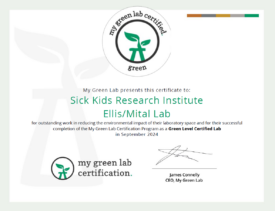Our research focusses on genomics, pharmacogenomics and stem cell applications in childhood heart disease. In 2015, we launched the Cardiac Precision Medicine Program focussed on precision medicine approaches for childhood onset heart disease. This includes the study of DNA using next-generation sequencing, and tissue and patient-derived induced pluripotent stem cells (iPSCs) in patients with congenital cardiac malformations and cardiomyopathies.
The goals are to identify gene defects that cause heart disease in children, identify the influence of genetic variations on disease severity and outcomes, and apply this knowledge to inform the clinical care of children with heart disease and discovery of new therapies for pediatric heart failure. An equally important goal is to study gene-environment interactions in causing heart disease. The approach to research is translational and includes clinical and basic research methodologies to answer these questions.
We have launched several large collaborative efforts to meet these goals:
Heart Centre Biobank Registry – The Heart Centre Biobank is a multi-centre research network which has resulted in the establishment of the first Ontario province-wide biorepository and registry of patients with congenital and other forms of heart disease.
Ted Rogers Centre for Heart Research – With the goal to significantly reduce heart failure in Canada over the next decade and beyond, The Hospital for Sick Children (SickKids), University Health Network (UHN) and the University of Toronto (U of T) announced the creation of the Ted Rogers Centre for Heart Research on November 20, 2014.
Canadian Heart Function Alliance-The Canadian Heart Function Alliance (CHF Alliance) brings together an extensive network of researchers, clinicians, patients, caregivers, Indigenous elders, policy-makers and other partner organizations across the country to explore a breadth of approaches to extending the lifespan of Canadians who have heart failure.
PROCEED – PeRsOnalized Genomics For CongEniTal HEart Disease- A international group of researchers, trainees and patient partners who together are unravelling the genomic basis of congenital heart disease to develop personalized approaches to prevention, prediction and treatment.
PRIMaCY – Precision Medicine in CardiomyopathY – PRIMaCY has developed an eHealth clinical decision support tool that generates an individualized 5-year risk prediction for sudden death for each patient. The primary goal is to implement the PRIMaCY tool in hospital information systems for use by physicians as a point of care tool, to evaluate the effectiveness of the tool in adherence to clinical practice guidelines, and to evaluate how it influences patient/family counseling.
Canadian National Transplant Research Program – The Canadian National Transplant Research Program (CNTRP) is a national research network designed to increase organ and tissue donation in Canada and enhance the survival and quality of life of Canadians who receive transplants.
MIBAVA – Mechanistic Interrogation of Bicuspid Aortic Valve associated Aortopathy. The MIBAVA network is a research network program established to identify factors that affect the clinical outcome of patients with BAV, with particular attention to the progression of aortic aneurysm.
PCS2 – Preventing Cardiac Sequelae in Paediatric Cancer Survivors – This is a multi-centre observational cohort study addressing the current limitations in prediction and early diagnosis of anthracycline-induced heart disease using studies based on biomarkers, genomics and cardiac imaging.



